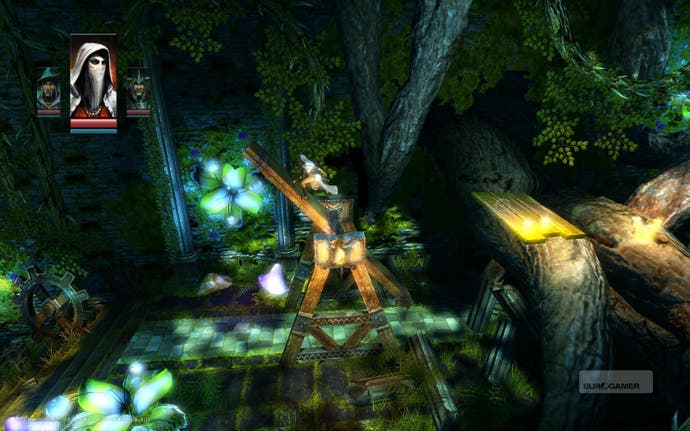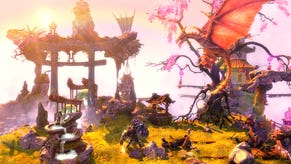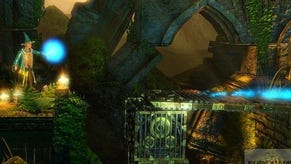Trine
Not an Australian railway simulator.
Despite the physics, control is mercifully crisp and consistent. There are occasional wobbles, where objects don't seem to fall as they should, but the floaty imprecision that dogged LittleBigPlanet is absent. The characters may leap higher and further than is realistic, but you're always confident that you can hurl yourself at a thin outcrop and the game engine won't let you down when it's time to stick the landing.
Combat, too, is simple yet enjoyable. Pontius has a single-mouse-button melee that wouldn't be out of place in Diablo, but the animations are so lively and the sense of impact and momentum so tangible that mashing your way through a dozen Argonauts-style skeletons remains amusing long after it should have become tiresome. Zoya's archery is a little more fiddly, but once you've mastered its nuances - and the game gives you plenty of opportunities to fine-tune your bow skills - there's nothing more satisfying than sending an enemy toppling from a ledge into the grinding gears of a huge machine with one well-placed arrow.
Your range of movement may be narrow, and your inventory limited, but the game offers depth in other ways, notably in the "give it a go" approach to puzzle-solving and the enormously satisfying drop-in co-op play. If the game is good honest fun when played solo, it's a blast with two players and a sublime joy with three. Having all three characters active at the same time opens up the game even more, allowing even more intricate solutions to problems. Complex sequences of actions that would have been impossible when swapping from one to the other with one hand on the keyboard suddenly become feasible. The only downside is that targeting is trickier with a thumb-stick than with a mouse, putting two players at a minor disadvantage.
Even so, co-op is so much fun that it's rather odd that the game seems to go out of its way to hide this wonderful feature. There's no mention of it on the main menu, or on the in-game HUD. Even if you've got a spare gamepad already plugged in, the game won't recognise it until you've squirreled into the options menu, then into the controls menu, and then enabled the second and third player. They can then, finally, drop into the game by pressing Start. Why this massively beneficial feature isn't activated by default is a mystery, but those who work it out are in for a treat.

With such a surplus of things to enjoy, it's a shame that the winning smile of the game engine isn't quite matched by the story and dialogue. It's decent enough, but the generic fantasy milieu feels uninspired while the tone never quite decides if it's being tongue-in-cheek or earnestly cheesy. The narration is fun - a bit like a cross between the Hitchhiker's Guide and Arthur Lowe reading the Mr. Men - but the characters have the annoying sound of stock RPG stereotypes, which can't help but dampen the mood. A little more Overlord, a little less Sacred II, would've gone a long way.
However, most of the criticisms that can be levelled at the game are the sort that should be prefaced with "It would be nice if..." Checkpoints, for example, could stand to be a little more frequent, especially as once a character has run out of energy, their abilities are off-limits until another energy vial is found. Harping on such quibbles isn't really worth the bother though.
Trine is simply an unpretentious and effortlessly lovely adventure, if never quite special enough to nudge into the echelons of 9/10 and above. Immediately likeable, hugely enjoyable and brimming with charming detail every step of the way, your enjoyment may depend on how many friends you can share the journey with, but few would regret time spent in the company of this trio.



